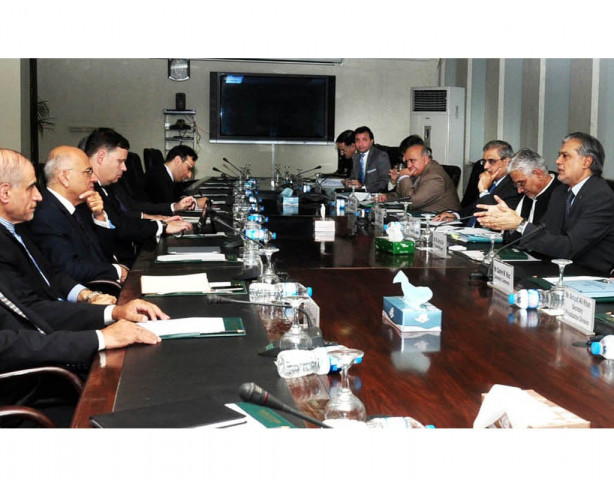Tough talk: IMF says meeting conditions must for release of tranches
IMF executive says waivers should not be expected by Islamabad.

Federal minister for finance Ishaq Dar in a meeting with Jafar Mojarrad of iMF. PHOTO: PID
In town for tough talk, the International Monetary Fund (IMF) envoy Jaffar Mojarrad has told the country’s top economic managers that in a departure from past practice, the fund would not give any waiver to Pakistan if it dishonoured any of its commitments under the $6.7 billion extended fund facility.
Mojarrad, one of twenty-four executive directors of the IMF who approved a $6.7 billion three-year loan for Pakistan last week, is visiting Islamabad along with Director for Central Asia and Middle East Masood Ahmed and IMF’s Washington-based mission chief for Pakistan, Jeffery Franks, as they seek to convey an overall sense of the IMF board’s thinking to Pakistan’s policymakers.
According to policymakers of the finance ministry, the delegation held an extensive meeting with Finance Minister Ishaq Dar on Tuesday where Mojarrad conveyed the IMF’s appreciation of Pakistan’s efforts to meet all pre-conditions set forth by the IMF for the approval of the programme.
However, while Mojarrad hoped that the momentum for economic reforms gained over the past few months would continue, he sounded a note of caution by emphasising that waivers under the programme should not be expected by Islamabad.

The IMF executive director also said that the fund recognised the difficult economic conditions prevalent in Pakistan, adding that China was the strongest supporter of approving the loan for Pakistan in the Executive Board meeting.
Under the approved extended fund facility, Pakistan will receive the $6.7 billion in 13 tranches, the first of which amounting to $547 million has been received by Pakistan. If Pakistan fails to implement any of agreed conditions, which according to Mojarrad have been conveyed in black and white, it will have to seek a waiver from the IMF Board or the remaining tranches will be suspended.
To meet pre-conditions for the approval of the loan, Pakistan had earlier increased power tariffs for industrial, commercial and bulk consumers, issued notices to over 10,000 tax evaders, sought Council of Common Interests approval for seeking Rs117 billion savings from provinces and conducted open market operations worth $125 million through the State Bank to support dwindling foreign currency reserves.
According to the IMF plan of action, next steps include raising the power tariff by 30% for domestic consumers, imposing a gas levy, finalizing the restructuring plan for 65 state-owned enterprises, amendments in Pakistan Penal Code, 1860, and Code of Criminal Procedures of 1898, preparation of plans for nine banks facing liquidity problems and the abolishment of the Pakistan Electric Power Company (Pepco). Sources have revealed that given Pakistan’s past history of ending IMF programs prematurely due to non-implementation of IMF conditions, the twenty-three Executive Directors of the IMF submitted written comments on Pakistan’s request, highlighting their concerns about the country’s ability to implement the latest round of stringent reform conditions.
One of the main areas of focus for the IMF will continue to be close monitoring of the federal government’s ability to bind provincial governments to take measures for provincial revenue mobilisation under next National Finance Commission (NFC) Award.
Later in the meeting, Finance Minister Ishaq Dar shared the government’s economic performance during the first two months of the new fiscal year with the visiting team. He told the delegation that the July-August 2013 figures for tax revenue collection demonstrated growth of 20% over the last year.
However, the minister failed to add that during the first two months, the target for revenue generation was missed by a cumulative Rs16 billion. Sources added that the IMF will now give greater importance to measuring targets at the quarterly level when it reviews performance during its first review meeting, likely to be held in early November.
Published in The Express Tribune, September 11th, 2013.



















COMMENTS
Comments are moderated and generally will be posted if they are on-topic and not abusive.
For more information, please see our Comments FAQ